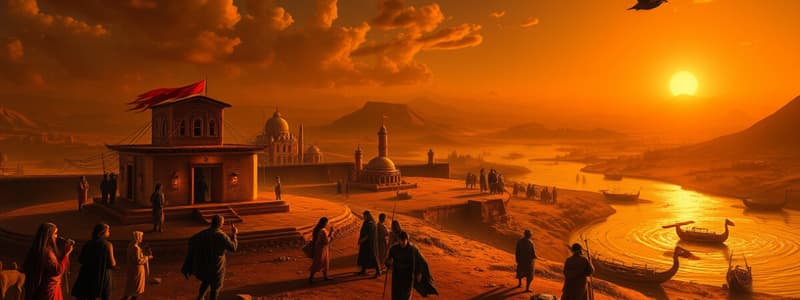Podcast
Questions and Answers
What were the major patterns of Native American life in North America before Europeans arrived?
What were the major patterns of Native American life in North America before Europeans arrived?
Native American societies were diverse with various cultures, languages, and ways of life, including hunting, gathering, and agriculture.
How did Indian and European ideas of freedom differ on the eve of contact?
How did Indian and European ideas of freedom differ on the eve of contact?
Indian ideas of freedom were often communal and tied to land and community, while European notions were more individualistic, focusing on personal rights and property ownership.
What impelled European explorers to look west across the Atlantic?
What impelled European explorers to look west across the Atlantic?
European explorers were driven by a desire for new trade routes, wealth, and the spread of Christianity.
Which of the following events occurred in 1492?
Which of the following events occurred in 1492?
The Pueblo Revolt occurred in 1608.
The Pueblo Revolt occurred in 1608.
Which Spanish explorer claimed Brazil for Portugal?
Which Spanish explorer claimed Brazil for Portugal?
What significant invention did Gutenberg introduce in the 1430s?
What significant invention did Gutenberg introduce in the 1430s?
Study Notes
Early Civilizations and Exploration
- Agriculture originated around 9000 BC in regions now known as Mexico and Peru.
- Mound Builders thrived from 5000 BC to 1000 AD in the Mississippi Valley.
- The Hopi and Zuni tribes established towns by 900 AD.
- Vikings reached Newfoundland around 1000 AD.
Significant Events in Exploration
- Cahokia emerged as a city-empire along the Mississippi by 1200.
- Chinese Admiral Zheng He explored the East African coast in the early 1430s; printing press invented by Gutenberg around the same time.
- Portuguese began exploring the African coast under Prince Henry from 1434.
- In 1487, Bartholomeu Dias rounded the Cape of Good Hope, paving the way for later explorations.
- Christopher Columbus's first voyage to the New World occurred in 1492, followed by John Cabot reaching Newfoundland in 1497.
Key Expeditions and Settlements
- Vasco da Gama sailed to the Indian Ocean in 1498, and Pedro Cabral claimed Brazil for Portugal in 1500.
- Nicolás de Ovando established a settlement on Hispaniola in 1502, marking one of the early European footholds in the Caribbean.
- The transatlantic slave trade began in 1502, with the first African slaves transported to Caribbean islands.
Religious and Political Changes
- Martin Luther's Ninety-Five Theses in 1517 ignited the Protestant Reformation.
- Hernán Cortés landed in Mexico in 1519, leading to Spanish conquests.
Spanish Conquests and Governance
- Pizarro conquered Peru in the 1530s, and Spain established the New Laws in 1542, aiming to protect indigenous rights.
- Samuel de Champlain founded Quebec in 1608, while Henry Hudson claimed New Netherland in 1609.
Cultural and Social Aspects
- Indian societies across North America varied in culture, land use, and governance.
- Mound Builders in the Mississippi River Valley created complex societies with large earthworks.
- Spanish colonists engaged in both conflicting and cooperative relationships with Native Americans, justified by religious and economic motives.
The Impact of European Contact
- European exploration triggered vast demographic and cultural shifts, leading to significant changes in both the Old and New Worlds.
- Native American life was dramatically disrupted by disease, warfare, and colonization following European contact.
- The concept of freedom differed greatly between Native Americans and Europeans, impacting interactions and experiences on both sides.
Conclusion
- The encounter between the peoples of the Americas and Europe initiated a legacy of exploration, conquest, and profound transformation still relevant today.
- Key individuals, events, and cultural exchanges during this period shaped the development of early American societies and European colonial ambitions.
Studying That Suits You
Use AI to generate personalized quizzes and flashcards to suit your learning preferences.
Related Documents
Description
Explore the fascinating beginnings of agriculture and significant milestones in early exploration. From the Mound Builders of North America to the expeditions led by famous explorers like Columbus and da Gama, this quiz delves into the interactions between civilizations and the impact of exploration on global history.




